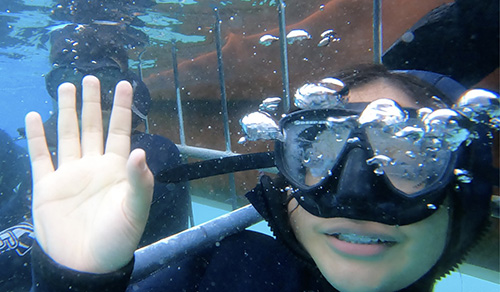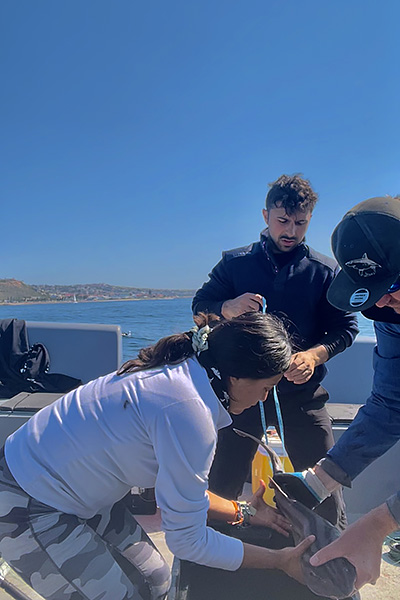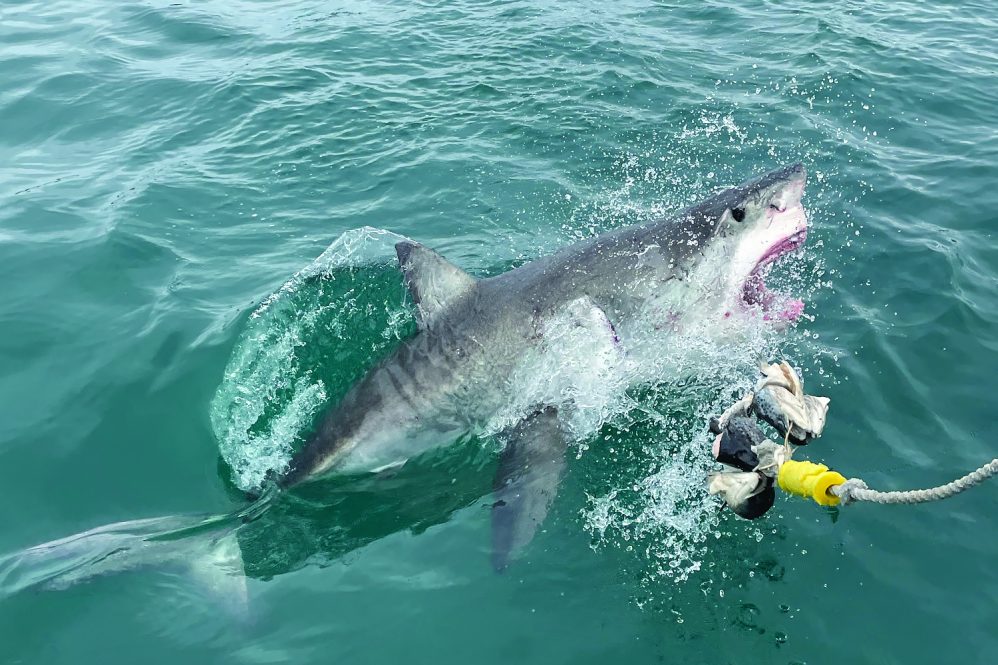For some people, sharks are terrifying creatures lurking in the sea. But for senior marine science major Melissa Sanchez ’22 (CLAS), studying sharks has always been a dream. Sanchez was one of only two students nationwide selected to participate in the 2021 Minorities in Shark Science Fellowship in Mossel Bay, South Africa.
The Minorities in Shark Science (MISS) initiative started in June 2020 as a result of the #BlackInNature hashtag. The fellowship was provided by the Oceans Research Institute, a non-profit institution founded by Enrico Gennari, a shark researcher who has appeared on the Discovery Channel and the National Geographic Channel.
“In today’s age, shark populations are declining rapidly, making research an important asset in helping save sharks and our ocean, which protects us all,” Sanchez says.
During the internship, students immerse themselves in marine science, including learning about and practicing seamanship, learning how to identify marine life, and how to operate and deploy marine equipment.
“During my whole life I have always been interested in sharks,” Sanchez says. “I grew up watching National Geographic and Animal Planet with my dad on the couch. I remember screaming at the top of my lungs, ‘That’s going to be me, that scuba diver person is going to be me!’ So, I was mind-blown that the internship was an opportunity I can be a part of.”

On a typical day, Sanchez would set out on a boat as early as 7 a.m. to sea-fish endemic sharks and to catch and identify various fish species. She would help with chumming, a method to attract sharks with a mix of fish bait. She would also help collect tissue samples of Pyjma sharks, an endemic species only found in South Africa, and identify different great whites through their dorsal fins as well as observe their behavior. In total, she observed 55 Pyjama and 91 great white sharks, in addition to African penguins, dolphins, seals, whales, and octopuses.
During the internship, Sanchez also achieved an advanced scuba diving certificate, volunteered at a sea bird sanctuary, and attended seminars on ocean research.
Sanchez says that shark research is important because without them, smaller ocean species would overpopulate and the marine ecosystem would become disrupted. While there is a preconceived notion that sharks are killers, she adds, humans are the biggest threat to the shark population due to overfishing, with approximately 100 million sharks killed each year.
Through her internship, Sanchez says she was able to contribute to marine sciences by specifically studying the population of great white sharks, which helps scientists determine trends, population size estimates, seasonality, and habitat use.

“I am very fortunate to have professors who are universally, nationally recognized for their hard work and what they do at UConn Avery Point,” Sanchez said. “Avery Point is different from Storrs in that class sizes are small, so I get to know professors on a personal level, which further enhances my learning. To get professors like this is just amazing; the classes I have taken have all prepared me to do fieldwork.”
Sanchez emphasized how appreciative she was to meet people who were like-minded and wanted to make a big change in the world. Through different programs, MISS hopes to create more opportunities for minority women studying shark science.
Sanchez added that she could not have done it without her marine science advisor, Claudia Koerting, a staff member in instrumentation support at UConn marine science research operations.
By the end of her internship, Sanchez realized that there is limited data on great white sharks because of how costly, how much effort, and how many years it may take to generate population trends. Now back in the U.S., Sanchez is currently conducting her own independent study on the population dynamics of fish pre- and post-COVID and will most likely demonstrate how humans impact affected fish populations.
“The advice I would give to anyone in any field is that you have to go for what you like and pursue it,” Sanchez says. “Opportunities are always available, but it’s the individual that has to go looking for them. I would say the initial step of just doing it is very much the most difficult one but it’s the most needed.”



